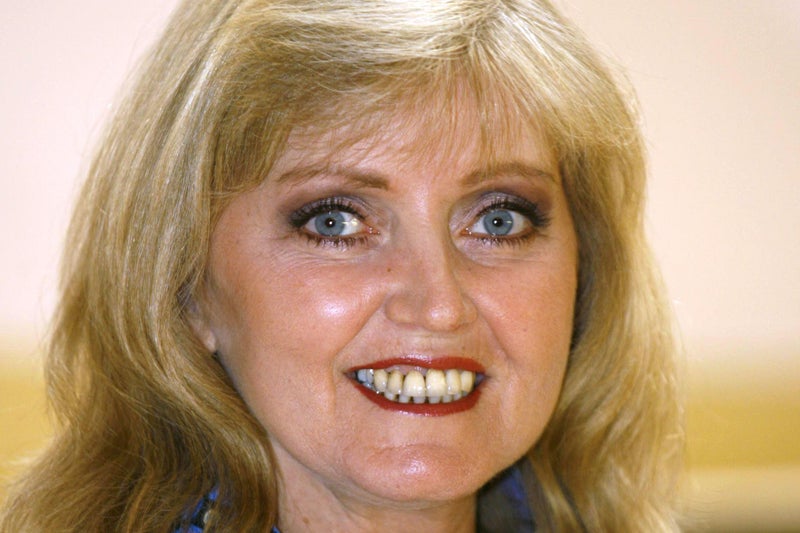For 15 years, Wayne Haddow had been a supportive presence in Julie Bayliss's life. A close friend of her children's father, he'd been there whenever she needed him - especially after the devastating loss of her 10-year-old son, Benjamin, in 2009. 'When our marriage fell apart, Wayne was there to support us. He helped take care of my kids, lent me appliances when we had to move out, took the kids to the park,' Julie tells Daily Mail Australia.
![[Julie knew that Wayne had been diagnosed with an arteriovenous malformation, a condition that meant he had an abnormal tangle of blood vessels in his brain that had caused a brain injury. So she put his behavioural changes down to that]](https://i.dailymail.co.uk/1s/2025/02/20/15/95284061-14404543-Julie_knew_that_Wayne_had_been_diagnosed_with_an_arteriovenous_m-a-21_1740064330092.jpg)
'My children loved him. He was so good to us that I fell for him.'. Julie was aware of Wayne's past, including his ties to an outlaw bikie gang, but the man she knew was calm, charming and attentive. He had built her up, asked questions about her life, and convinced her he was her safe place.
![[Wayne dictated what Julie wore, what she ate, who she spoke to and when she could go to the bathroom. Then came the first assault]](https://i.dailymail.co.uk/1s/2025/02/20/15/95284055-14404543-Wayne_dictated_what_Julie_wore_what_she_ate_who_she_spoke_to_and-a-22_1740064330104.jpg)
'He made me feel heard,' Julie says. The shift in Wayne's behaviour was gradual. At first, the changes were small - complaints about noise, unexplained frustration. For 15 years, Wayne was Julie's supportive friend. After her marriage ended, they began a relationship.
Julie knew that Wayne had been diagnosed with an arteriovenous malformation, a condition that meant he had an abnormal tangle of blood vessels in his brain that had caused a brain injury. So she put his behavioural shift down to that. Then, in 2017, Wayne had a seizure.
'He changed a lot,' Julie recalls. 'He started getting really irritable, and I put it together - well, it must be the brain injury.'. She wasn't alone in believing it. Wayne himself began using his diagnosis as an excuse for his worsening behaviour. When doctors said the injury was not in a location that could cause behavioural changes, Wayne insisted to Julie that they had got it wrong.
The verbal abuse escalated into coercive control. He dictated what she wore, what she ate, when she was allowed to speak, even when she could go to the bathroom. Then came the first assault. Julie knew that Wayne had been diagnosed with an arteriovenous malformation, a condition that meant he had an abnormal tangle of blood vessels in his brain that had caused a brain injury. So she put his behavioural changes down to that.
'We were walking into the house, and he kicked my legs out from under me in the street. I had long hair then, and he grabbed me by the hair and threw me across the room into a table. I was in absolute shock. Just did not expect that from him at all.'. The next morning, Wayne apologised. He blamed the brain injury.
'He swore blind that he had never raised his hand to a woman before. And I believed him. I had known him for 15 years.'. But it didn't stop. Julie was working more than 60 hours a week in disability care while Wayne was unemployed. If she tried to rest, he would wake her, berating her for being lazy. She ended up with severe sleep deprivation.
He forcibly acquired her ADHD medication, keeping her exhausted and unable to think clearly. He made her question her own experiences and memory. As his control tightened, he started using her vulnerabilities against her - the very things he had seemed to cherish in the beginning. The compliments turned to criticisms, the patience to rage. 'You need to lose 5kg.' Then, 'You've lost your curves, put 2kg back on.'.
One night, he threatened to burn the house down with her and the kids inside, before beating her. The next afternoon, while she lay bruised and battered in hospital, he called - not to check on her, but to demand when she would be home to cook dinner.
Wayne dictated what Julie wore, what she ate, who she spoke to and when she could go to the bathroom. Then came the first assault. Another evening, Julie's son didn't rinse the soap bubbles properly after washing the dishes. Wayne lost control. 'He went off his brain at me. I said I would talk to my son about it when he got home from school, but Wayne kept yelling and yelling.
'I told him not to speak to me like that, and he hit me in the side of the head. I got up, and he hit me again. I kept getting up, and he kept hitting me - again and again. In the head, in the face. 'He kicked me in the stomach, choked me, and threw me onto the table. He told me he would break my ribs and smash my face with his fist.'.
He wasn't sorry. He believed he was justified. Soon Wayne was in the hospital again after another episode with his brain injury. Julie was pleading with the doctors to help him, convinced his outbursts were caused by his condition. Then the doctor pulled her aside.
'He said, "Can you come see me before you go in?" I thought he was going to tell me Wayne was getting worse. Instead, he looked me in the eye and said, "This [the abuse] is not the brain injury."'. Julie tried to argue. But then the doctor said something she couldn't ignore.
'He said, "If it was the brain injury, why isn't he doing this anywhere else? Why not at work, with his friends, his family? Why only you and your children?"'. The realisation was shattering. If the doctor was right, it meant everything had been a lie. It meant Wayne was in control of his actions. It meant he knew exactly what he was doing.






























